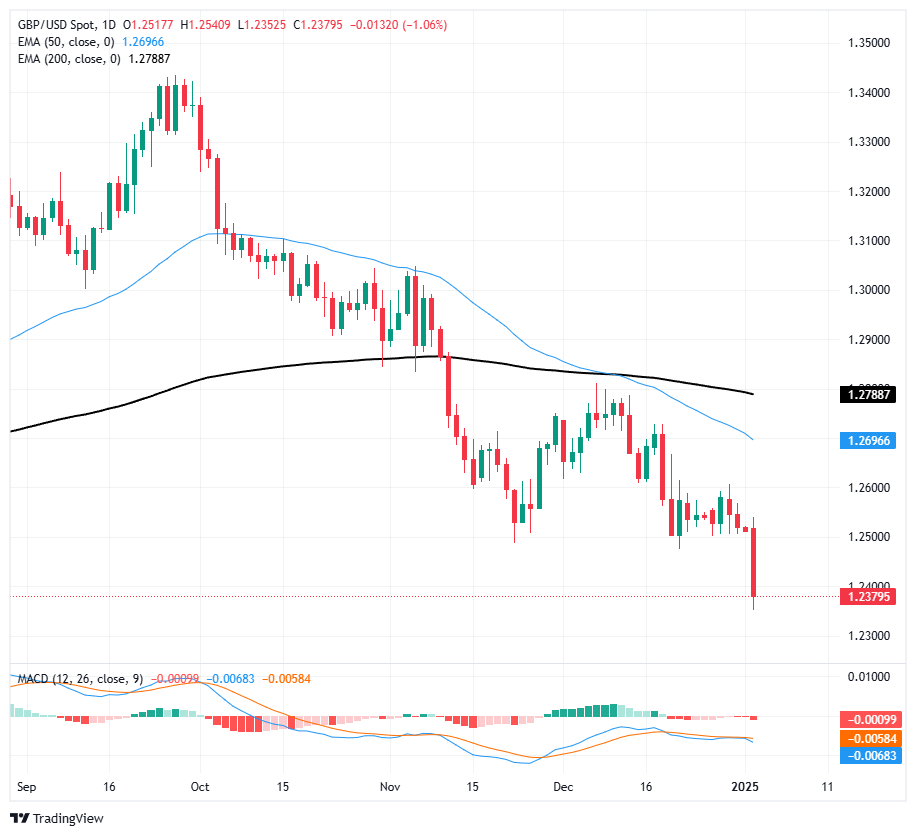- GBP/USD deteriorated on Thursday, falling below 1.2400 for the first time since April.
- January has just begun, but Cable is already on track to end the month on a negative note.
- US PMI figures on Friday will complete the week’s economic calendar.
GBP/USD struck a soft note on Thursday, falling more than one percent at the start of the new trading season and piercing the 1.2400 zone for the first time in almost ten months. Market volumes remain light following the mid-week New Year’s holiday, but orders coming in have a decidedly risk-averse stance.
Economic data from the UK side remains subdued for the remainder of the first trading week of 2025, leaving Cable traders to contend with a fresh update to the US Purchasing Managers’ Index (PMI) figures. .US scheduled for Friday. UK money supply and mortgage approvals are due out early on Friday, but the low-impact numbers are unlikely to move markets.
US ISM Manufacturing PMI survey results for December are expected to remain stable, with the print forecast at a contractionary 48.4, in line with the preliminary reading. Despite a slight month-on-month increase, U.S. businesses continue to have a tepid outlook on activity in the first quarter of 2025 as domestic demand cools.
The key takeaway for Cable traders will be the rate differential during the first half of 2025. The Federal Reserve (Fed) is expected to make far fewer rate cuts during the year than previously expected. The Fed itself only expects to make a total of two 25 basis point rate cuts throughout 2025, as noted in the US central bank’s Summary of Economic Projections (SEP) in December.
GBP/USD Price Forecast
GBP/USD took a fresh decline, retreating below 1.2400 and the pair is set for a fresh decline towards the 1.2300 area. The 50-day exponential moving average (EMA) is accelerating towards the bearish side below 1.2700 after crossing the long-term 200-day EMA near 1.2780, which will put further downward pressure on the price action in the short term.
GBP/USD Daily Chart
British Pound FAQs
The British Pound (GBP) is the oldest currency in the world (AD 886) and the official currency of the United Kingdom. It is the fourth most traded foreign exchange (FX) unit in the world, accounting for 12% of all transactions, averaging $630 billion a day, according to 2022 data. Its key trading pairs are GBP/ USD, which represents 11% of FX, GBP/JPY (3%) and EUR/GBP (2%). The British Pound is issued by the Bank of England (BoE).
The most important factor influencing the value of the Pound Sterling is the monetary policy decided by the Bank of England. The Bank of England bases its decisions on whether it has achieved its main objective of “price stability” – a constant inflation rate of around 2%. Its main tool to achieve this is the adjustment of interest rates. When inflation is too high, the Bank of England will try to control it by raising interest rates, making it more expensive for people and businesses to access credit. This is generally positive for sterling, as higher interest rates make the UK a more attractive place for global investors to invest their money. When inflation falls too much it is a sign that economic growth is slowing. In this scenario, the Bank of England will consider lowering interest rates to make credit cheaper, so that companies will take on more debt to invest in projects that generate growth.
The data released measures the health of the economy and can affect the value of the pound. Indicators such as GDP, manufacturing and services PMIs and employment can influence the direction of the Pound.
Another important data that is published and affects the British Pound is the trade balance. This indicator measures the difference between what a country earns from its exports and what it spends on imports during a given period. If a country produces highly in-demand export products, its currency will benefit exclusively from the additional demand created by foreign buyers seeking to purchase those goods. Therefore, a positive net trade balance strengthens a currency and vice versa in the case of a negative balance.
Source: Fx Street
I am Joshua Winder, a senior-level journalist and editor at World Stock Market. I specialize in covering news related to the stock market and economic trends. With more than 8 years of experience in this field, I have become an expert in financial reporting.







